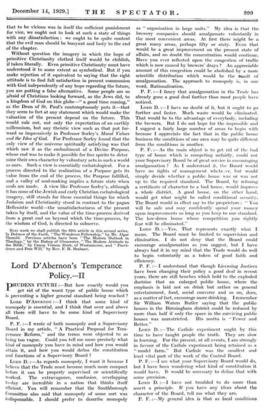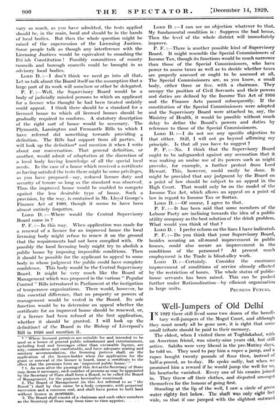P RUDEN'S FUTURI :—But how exactly would you get rid of
the worst type of public house which is preventing a higher general standard being reached ?
LORD D'ABERNON :-I think that some kind of monopoly is essential, and I think that over and above all there will have to be some kind of Supervisory Board.
P. F. :—I wrote of both monopoly and a Supervisory Board in my article, " A Practical Proposal for Tem- perance Reform," and the terms were objected to as being too vague. Could you tell me more precisely what kind of monopoly you have in mind and how you would attain it, and how you would define the constitution and functions of a Supervisory Board ?
Loan D.:—As regards monopoly, I want it because I believe that the Trade must become much more compact before it can be properly supervised or scientifically worked. The extravagance, confusion, overlapping to-day are incredible in a nation that thinks itself efficient. You will remember that the Southborough Committee also said that -monopoly of some sort was indispensable. I should prefer to describe monopoly as " organization in large units." My idea is that the brewery . companies should amalgamate voluntarily in the most convenient areas. At first there might be a great many areas, perhaps fifty or sixty. Even that would be a great improvement on the present state of affairs, and no doubt the concentration would continue.
Have you ever reflected upon the congestion of traffic which is now caused by brewers' drays ? An appreciable amount of this congestion could be abolished by a more scientific distribution which would be the result of amalgamation. The approach to monopoly is, in one word, Rationalization.
P. F. :—I fancy that amalgamation in the Trade has already gone a good deal further than most people have noticed.
LORD D. :—I have no doubt of it, but it ought to go further and faster. Much waste would be eliminated. That would be to the advantage of everybody, including the brewers. But I do not hope for the impossible and I suggest a fairly large number of areas to begin with because I appreciate the fact that in the public house business the conditions of one area may be quite different from the conditions in another.
P. F. :—As the main object is to get rid of the bad type of house which is competing unfairly, could not your Supervisory Board be of great service in encouraging amalgamation ? As I understand it, the Board would have no rights of management whate .-er, but would simply decide whether a public house was or was not up to the required standard. The Board, by refusing a certificate of character to a bad house, would improve a whole district. A good house, on the other hand, would get what might be called conditional security. The Board would in effect say to the proprietors : " You will be safe and may confidently spend your money upon improvements so long as you keep to our standard. The low-down house whose competition you rightly fear will be eliminated."
LORD D. :—Yes. That represents exactly what I mean. The Board must be limited to supervision and elimination. I do not deny that the Board could encourage amalgamation as you suggest, but I have always had it in my mind that the Trade would do well to begin voluntarily as a token of good faith and efficiency.
P. F. :—I understand that though Licensing Justices have been changing their policy a good deal in recent years, there are still benches which hold to the exploded doctrine that an enlarged public house, where the emphasis is laid not on drink but rather on general entertainment, food, social converse and so on, does, as a matter of fact, encourage more drinking. I remember Sir William Waters Butler saying that the public houses in the Birmingham district could be reduced by more than half if only the space in the surviving public houses was unrestricted. His motto is • Fewer and Better."
LORD D. :—The Carlisle experiment ought by this time to have taught people the truth. They are slow in learning. For the present, at all events, I am strongly in favour of the Carlisle experiment being retained as a " model farm." But Carlisle was the smallest and least vital part of the work of the Control Board.
P. F. :—I see what your Supervisory Board would do, but I have been wondering what kind of constitution it would have. It would be necessary to define that with some precision.
LORD D. :—I have not troubled to do more than assert a principle. If you have any ideas about the character of the Board, tell me what they are.
F. F. :—My general idea is that as local conditions vary so much, as you have admitted, the tests applied should be, in the main, local and should be in the hands of local bodies. But then the whole question might be raised of the supersession of the Licensing Justices. Some people talk as though any interference with the Licensing Justices would be equivalent to smashing the British Constitution ! Possibly committees of county councils and borough councils could be brought in as advisory local bodies.
LORD D. :—I don't think we need go into all that. Let us talk about the Board itself on the assumption that a large part of its work will somehow or other be delegated.
P. F. :—Well, the Supervisory Board would be a body of judicially minded persons to which an applicant for a licence who thought he had been treated unfairly could appeal. I think there should be a standard for a licensed house to which all licensed houses should be gradually required to conform. A statutory description of the right sort of house would be necessary. The Plymouth, Lamington and Fremantle Bills to which I have referred did something towards providing a definition. The Bills had support from all parties. I will look up the definition* and mention it when I write about our conversation. That general definition, or another, would admit of adaptation at the discretion of a local body having knowledge of all the special local needs. In the case of a house which received a certificate as having satisfied the tests there might be some privileges, as you have proposed— say, reduced licence duty and security of tenure so long as the standard was observed. Thus the improved house would be enabled to compete against the less desirable type of house. Such a provision, by the way, is contained in Mr. Lloyd George's Finance Act of 1909, though it seems to have been almost entirely forgotten.
LORD D. :—Where would the Central Supervisory Board come -in ?
P. F. :—In this way. When application was made for a renewal of a licence for an improved house the local licensing body might refuse to renew it on the ground that the requirements had not been complied with. Or possibly the local licensing body might try to abolish a public house by imposing impossible conditions. Then it should be possible for the applicant to appeal to some body in whose judgment the public could have complete confidence. This body would be the Central Supervisory Board. It might be very much like the Board of Management which was proposed in the various " Popular Control " Bills introduced in Parliament at the instigation of temperance organizations. There would, however, be this essential difference, that no property or powers of management would be vested in the Board. Its sole function would be to determine on appeal whether the certificate for an improved house should be renewed, or, if a licence had been refused at the first application, whether it should be granted. I will look up the definitiont of the Board in the Bishop of Liverpool's Bill in 1926 and mention it.
• " Where licensed premises are suitable for and intended to be used as a house of general public refreshment and entertainment, including food and beverages other than exciseable liquors, are airy, commodious and comfortable, and have adequate seating and sanitary accommodation, the licensing justices shall, on the application of the licence-holder when the application for the grant or renewal of the licence is heard, issue a certificate to the effect that the premises form an ' improved public house.' " • t 1. As soon after the passing of this Act as the Secretary of State may deem it necessary, such number of persons as may be appointed by the Secretary of State shalt form a Board, to be called the Board of Management, for the purposes hereinafter mentioned.
2. The Board of Management (in this Act referred to as " the Board ") shall by that name be a body corporate, with perpetual succession and a common seal, and shall have power to hold land without licence in raortmain.
3. The Board shall consist of a chairman and such other members as the Secretary of State may from time to time appoint. LORD D. :—I can see no objection whatever to that. My fundamental condition is : Suppress the bad house. Then the level of the whole district will immediately improve.
P. F. :—There is another possible kind of Supervisory Board. It might resemble the Special Commissioners of Income Tax, though its functions would be much narrower than those of the Special Commissioners, who have power to assess taxes as well as to decide whether taxes are properly assessed or ought to be assessed at all. The Special Commissioners are, as you know, a small body, either three or five. with a chairman. They occupy the position of Civil Servants and their powers and duties are defined by the Income Tax Act of 1916 and the Finance Acts passed subsequently. If the constitution of the Special Commissioners were adopted and the Supervisory Board were attached to, say, the Ministry of Health, it would be possible without much delay to define the Board's powers and duties by reference to those of the Special Commissioners.
LORD D. :—I do not see any specific objection to that either. Still, I will not go beyond affirming my principle. Is that all you have to suggest ?
P. F. :—No. I think that the Supervisory Board ought to he safeguarded against any accusation that it was making an undue use of its powers such as might provoke, for example, a further protest from Lord Hewart. This, however, could easily be done. It might be provided that any judgment by the Board on a point of law should be subject to an appeal in the High Court. That would only be on the model of the Income Tax Act, which allows an appeal on a point of law in regard to Income Tax or Surtax.
LORD D.:—Of course, I agree to that.
P. F. :—It has been said that some members of the Labour Party are inclining towards the idea of a public utility company as the best solution of the drink problem, What would you think of that ?
LORD D.: I prefer reform on the lines I have indicated: P. F. :—Do you think that your Supervisory Board, besides securing an all-round improvement in public houses, could also secure an improvement in the conditions of the personnel ? At present much employment is the Trade is blind-alley work.
LORD D. :—Certainly. Consider the enormous improvement of conditions of service already effected by the restriction of hours. The whole status of public- house servants has been raised. This can be pushed further under Rationalization—by efficient organization in large units.
PRUDENS FUTURI.













































 Previous page
Previous page